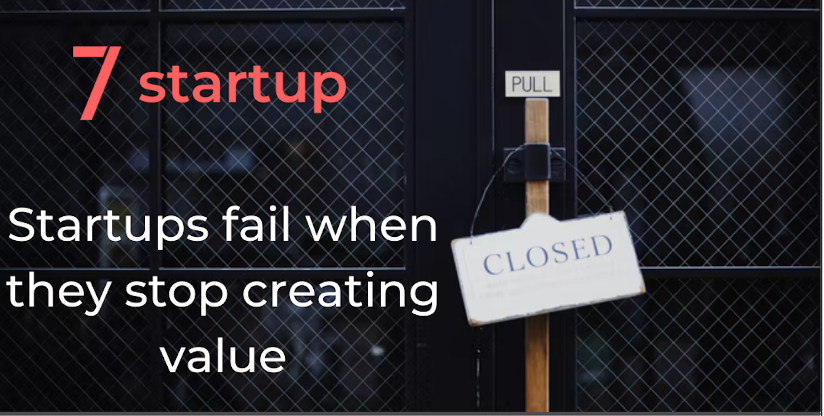Have you ever wondered why so many startups fail? On the surface, even if they appear to be doing well. many of them fail, albeit slowly at first, and eventually collapse. Value generation is the foundation for each business. Every startup should have one goal: to create and offer value in such a way that it generates profit after expenses.
I have been thinking about this problem for nearly 10 years ever since the second startup I founded, a data-driven market analysis software that incorporated sentiment analysis, shut down. Founded with a Ph.D. in sensor technologies. The company aimed to provide signals for investment using artificial intelligence. But after spending hundreds of hours and securing angel investment. We introduced a product but too few customers were interested in buying it.
What is Value Creation? 
Value creation is a key idea to grasp because it is the beginning point for all businesses, whether successful or not. A business’s goal is to generate value through work, sell or trade it to customers, and profit from a share of that value.
The products, services, and features within an industry may differ, but the methods for creating value for your consumer are essentially sector agnostic:
- The definition of value and how to create it
- Value generation has evolved over time and will continue to do so in the future.
- How can value be assessed and managed?
The methods for creating value for a SaaS product are always growing within the startup ecosystem. Making the dynamics driving company growth dynamic in nature.
The process for companies to identify must include:
- the right market,
- target audience, and
- a successful launch of the product evolving over time.
Startups Fail as All Value is Not Created the Same

How can we choose which form of value creation to pursue, given the vast and ever-increasing number of options? Is each method of creating value equally beneficial to us?
Peter Thiel isn’t convinced. He discusses the conditions of a successful business in his immensely informative book, Zero to One. Although all organisations must create value, some forms of value and value creation approaches are more beneficial than others. In this Stanford address, he summarises his book:
Producing a commoditized product to create value is not a successful strategy.
Consider your product or service’s substitutability:
- Do customers have plenty of other choices?
- Is it necessary for them to make a purchase?
- Are you distinguishable from your competition in a significant way?
If your startup is in a highly competitive field, the loss of your company won’t make a difference because another undifferentiated competitor will always be ready to take your place.
Value creation and revenue
Revenue is the most straightforward approach to assess value generation. This measure assures that the value-creation process was not in vain if someone is prepared to pay for it.
Revenue, not profit, is the metric through which value is created. It is possible for a corporation to create value without making a profit, and many do. They don’t do it for long, though.
1. Create value
The first stage of the value cycle is to create and sell a product that consumers want to use because it better solves their most basic needs than competing products.
After Netscape’s initial public offering in 1995, the Mosaic web browser became popular. That widespread popularity signals to me that Netscape had succeeded in value creation, letting individuals view websites for the first time better than virtually any other browser at the time.
2. Capture value
The second stage of the value cycle involves deciding which business activities to pursue so that customers are willing to pay a price for a product that is sufficiently higher than the company’s costs to generate sufficient profit and provide a return to shareholders after compensating employees and suppliers. You must first generate and then capture value otherwise thats how startups fail.
Netscape is an excellent example of a business that created value but failed to capitalise on it. What do you mean by that? Many individuals utilised this browser, but they did not pay for it. Furthermore, Netscape’s other revenue streams were insufficient to keep company afloat in the face of Microsoft’s assault. As a result, AOL purchased the company in 1998 for $4.2 billion.
3. Renew value 
The value cycle’s last stage involves filtering out the noise from market signals such as changing customer wants, upstart competitors, and evolving technology to determine how a company must change to stay ahead of the competition.
For startups striving to survive in the long run, this value renewal is the most difficult aspect of the value cycle.
Conclusion
When I think about how our economy has created value over the last 100 years, I believe we’ve evolved from a focus on large-scale mechanical manufacturing during the industrial revolution to more creative and individualised production during the information age. Software and related services are increasingly dominating value production.
Startups fail for a variety of reasons, including a lack of product-market fit, marketing issues, team issues, and lack of funding. Because our economy is more flexible and individualistic in 2022, we must understand and ensure that the value created, extracted, and renewed by startups is long-term.

Amit Khanna, 7startup Founder
Amit has 18 years of experience in the industry and an MBA. He supports entrepreneurs with every aspect of their business including concept and product development, investor presentations, and fundraising. Amit & 7startup assist startups in the pre due-diligence process and help connect them to our vast network of investors. Reach out to us today and see if we’re a fit!






